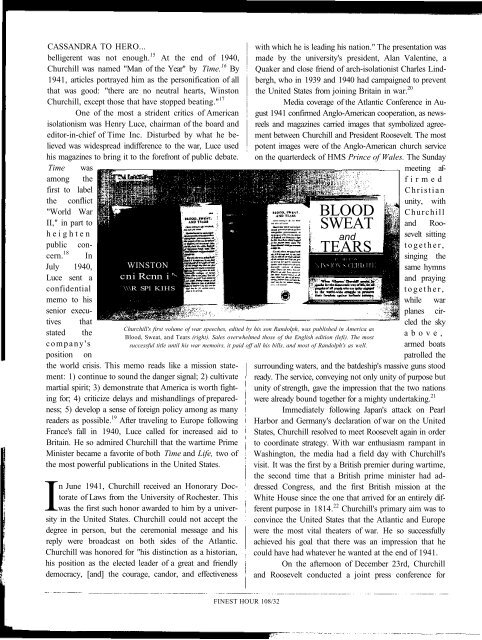journal of the churchill center and societies - Winston Churchill
journal of the churchill center and societies - Winston Churchill
journal of the churchill center and societies - Winston Churchill
- No tags were found...
Create successful ePaper yourself
Turn your PDF publications into a flip-book with our unique Google optimized e-Paper software.
• / • • ' ! • " ' • • .<br />
CASSANDRA TO HERO...<br />
belligerent was not enough. 15 At <strong>the</strong> end <strong>of</strong> 1940,<br />
<strong>Churchill</strong> was named "Man <strong>of</strong> <strong>the</strong> Year" by Time. 16 By<br />
1941, articles portrayed him as <strong>the</strong> personification <strong>of</strong> all<br />
that was good: "<strong>the</strong>re are no neutral hearts, <strong>Winston</strong><br />
<strong>Churchill</strong>, except those that have stopped beating." 17<br />
One <strong>of</strong> <strong>the</strong> most a strident critics <strong>of</strong> American<br />
isolationism was Henry Luce, chairman <strong>of</strong> <strong>the</strong> board <strong>and</strong><br />
editor-in-chief <strong>of</strong> Time Inc. Disturbed by what he believed<br />
was widespread indifference to <strong>the</strong> war, Luce used<br />
his magazines to bring it to <strong>the</strong> forefront <strong>of</strong> public debate.<br />
Time was<br />
among <strong>the</strong><br />
first to label<br />
<strong>the</strong> conflict<br />
"World War<br />
II," in part to<br />
heighten<br />
public concern.<br />
18 In<br />
July 1940,<br />
Luce sent a<br />
confidential<br />
memo to his<br />
senior executives<br />
that<br />
stated <strong>the</strong><br />
company's<br />
position on<br />
WINSTON<br />
cni Rcnn i '<br />
\\\R SP1 KIHS<br />
<strong>the</strong> world crisis. This memo reads like a mission statement:<br />
1) continue to sound <strong>the</strong> danger signal; 2) cultivate<br />
martial spirit; 3) demonstrate that America is worth fighting<br />
for; 4) criticize delays <strong>and</strong> mish<strong>and</strong>lings <strong>of</strong> preparedness;<br />
5) develop a sense <strong>of</strong> foreign policy among as many<br />
readers as possible. 19 After traveling to Europe following<br />
France's fall in 1940, Luce called for increased aid to<br />
Britain. He so admired <strong>Churchill</strong> that <strong>the</strong> wartime Prime<br />
Minister became a favorite <strong>of</strong> both Time <strong>and</strong> Life, two <strong>of</strong><br />
<strong>the</strong> most powerful publications in <strong>the</strong> United States.<br />
In June 1941, <strong>Churchill</strong> received an Honorary Doctorate<br />
<strong>of</strong> Laws from <strong>the</strong> University <strong>of</strong> Rochester. This<br />
was <strong>the</strong> first such honor awarded to him by a university<br />
in <strong>the</strong> United States. <strong>Churchill</strong> could not accept <strong>the</strong><br />
degree in person, but <strong>the</strong> ceremonial message <strong>and</strong> his<br />
reply were broadcast on both sides <strong>of</strong> <strong>the</strong> Atlantic.<br />
<strong>Churchill</strong> was honored for "his distinction as a historian,<br />
his position as <strong>the</strong> elected leader <strong>of</strong> a great <strong>and</strong> friendly<br />
democracy, [<strong>and</strong>] <strong>the</strong> courage, c<strong>and</strong>or, <strong>and</strong> effectiveness<br />
with which he is leading his nation." The presentation was<br />
made by <strong>the</strong> university's president, Alan Valentine, a<br />
Quaker <strong>and</strong> close friend <strong>of</strong> arch-isolationist Charles Lindbergh,<br />
who in 1939 <strong>and</strong> 1940 had campaigned to prevent<br />
<strong>the</strong> United States from joining Britain in war. 20<br />
Media coverage <strong>of</strong> <strong>the</strong> Atlantic Conference in August<br />
1941 confirmed Anglo-American cooperation, as newsreels<br />
<strong>and</strong> magazines carried images that symbolized agreement<br />
between <strong>Churchill</strong> <strong>and</strong> President Roosevelt. The most<br />
potent images were <strong>of</strong> <strong>the</strong> Anglo-American church service<br />
on <strong>the</strong> quarterdeck <strong>of</strong> HMS Prince <strong>of</strong> Wales. The Sunday<br />
meeting affirmed<br />
Christian<br />
unity, with<br />
<strong>Churchill</strong><br />
BLOOD<br />
SWEAT<br />
<strong>and</strong><br />
TEARS<br />
<strong>and</strong> Roosevelt<br />
sitting<br />
toge<strong>the</strong>r,<br />
singing <strong>the</strong><br />
same hymns<br />
<strong>and</strong> praying<br />
toge<strong>the</strong>r,<br />
while war<br />
planes circled<br />
<strong>the</strong> sky<br />
above,<br />
armed boats<br />
patrolled <strong>the</strong><br />
surrounding waters, <strong>and</strong> <strong>the</strong> batdeship's massive guns stood<br />
ready. The service, conveying not only unity <strong>of</strong> purpose but<br />
unity <strong>of</strong> strength, gave <strong>the</strong> impression that <strong>the</strong> two nations<br />
were already bound toge<strong>the</strong>r for a mighty undertaking. 21<br />
Immediately following Japan's attack on Pearl<br />
Harbor <strong>and</strong> Germany's declaration <strong>of</strong> war on <strong>the</strong> United<br />
States, <strong>Churchill</strong> resolved to meet Roosevelt again in order<br />
to coordinate strategy. With war enthusiasm rampant in<br />
Washington, <strong>the</strong> media had a field day with <strong>Churchill</strong>'s<br />
visit. It was <strong>the</strong> first by a British premier during wartime,<br />
<strong>the</strong> second time that a British prime minister had addressed<br />
Congress, <strong>and</strong> <strong>the</strong> first British mission at <strong>the</strong><br />
White House since <strong>the</strong> one that arrived for an entirely different<br />
purpose in 1814. 22 <strong>Churchill</strong>'s primary aim was to<br />
convince <strong>the</strong> United States that <strong>the</strong> Atlantic <strong>and</strong> Europe<br />
were <strong>the</strong> most vital <strong>the</strong>aters <strong>of</strong> war. He so successfully<br />
achieved his goal that <strong>the</strong>re was an impression that he<br />
could have had whatever he wanted at <strong>the</strong> end <strong>of</strong> 1941.<br />
On <strong>the</strong> afternoon <strong>of</strong> December 23rd, <strong>Churchill</strong><br />
<strong>and</strong> Roosevelt conducted a joint press conference for<br />
<strong>Churchill</strong>'s first volume <strong>of</strong> war speeches, edited by his son R<strong>and</strong>olph, was published in America as<br />
Blood, Sweat, <strong>and</strong> Tears (right). Sales overwhelmed those <strong>of</strong> <strong>the</strong> English edition (lefi). The most<br />
successful title until his war memoirs, it paid <strong>of</strong>f all his bills, <strong>and</strong> most <strong>of</strong> R<strong>and</strong>olph's as well.<br />
FINEST HOUR 108/32

















